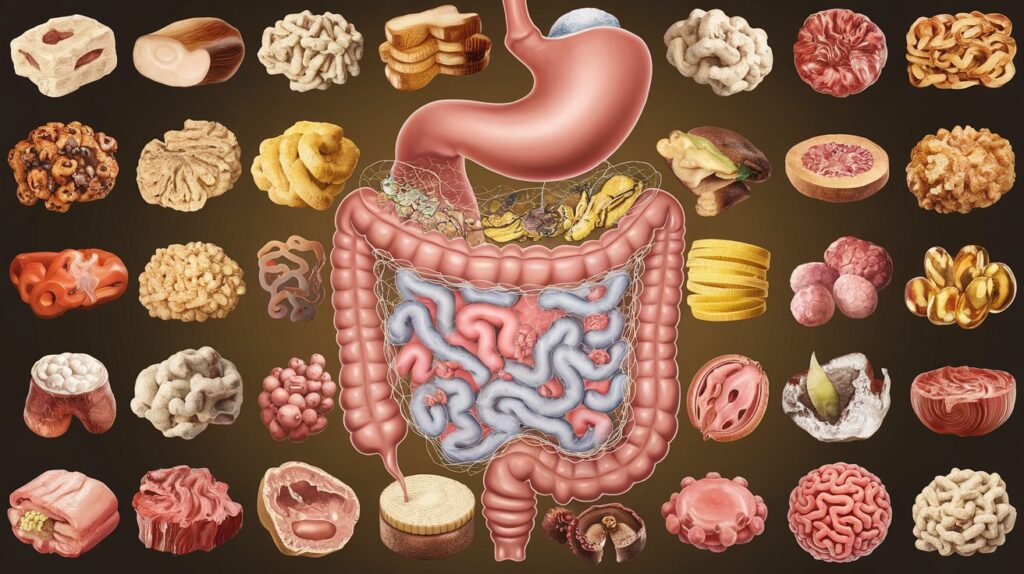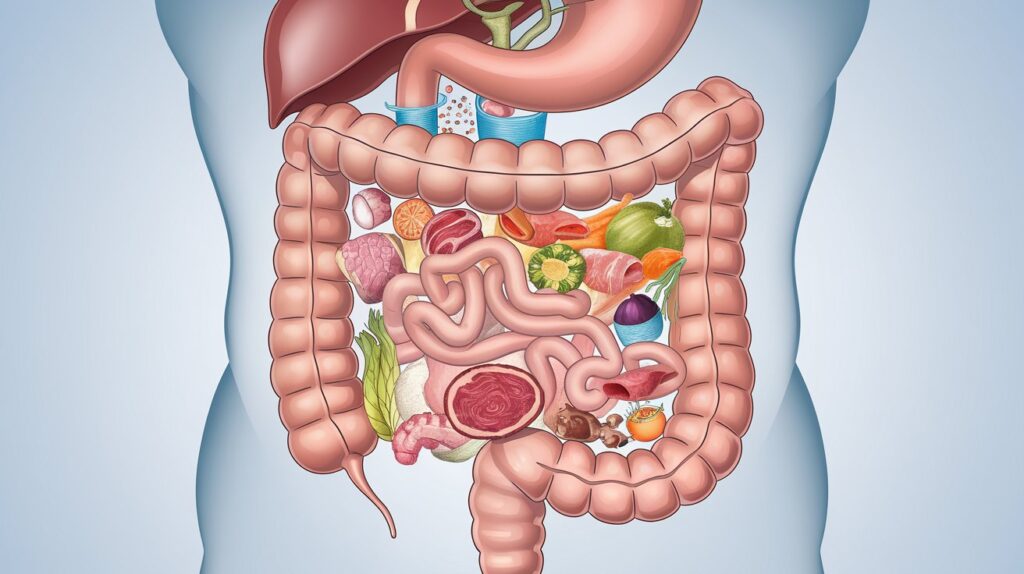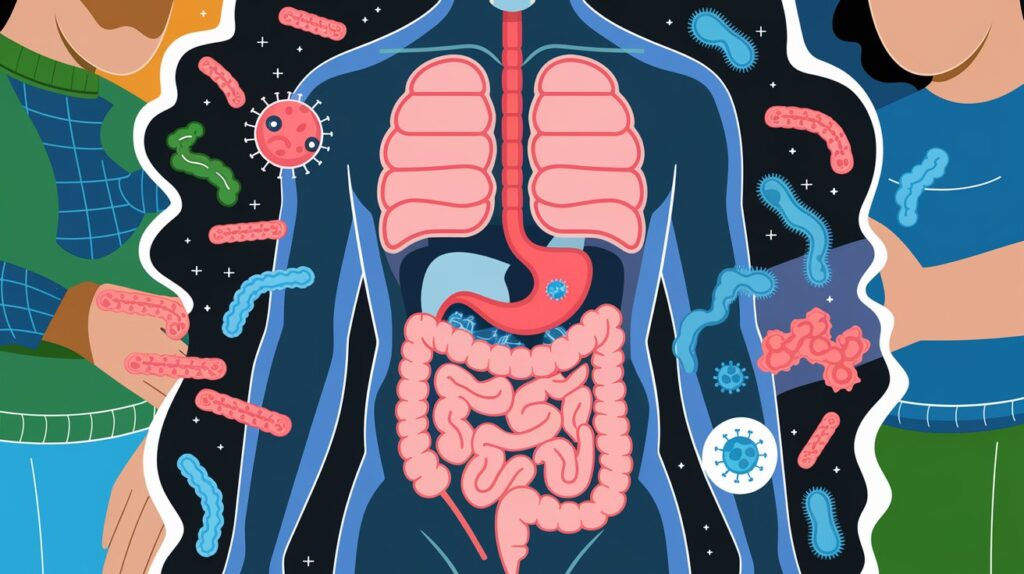
The Key to Your Overall Well-being: What is Gut Health?
Gut health is a term that refers to the proper functioning of your digestive system and the balance of microorganisms that reside in your intestines. This microbiome plays a crucial role in maintaining many aspects of your health, such as digestion, immune function, and even mental well-being. If your gut health is in check, your body works more efficiently, and it’s more resilient against illness.
Why is Gut Health So Important?
A healthy gut isn’t just about avoiding an upset stomach; it’s foundational for many bodily functions. Here’s how:

- Digestion: Your gut is responsible for breaking down the food you eat into essential nutrients that your body needs to function. When your gut is healthy, digestion runs smoothly, and you absorb nutrients properly.
- Nutrient Absorption: Proper gut health ensures that your body absorbs critical vitamins, minerals, and other nutrients. With good gut health, your body may be able to get the nourishment it needs, even if you’re eating well.
- Immune Function: A large portion of your immune system is located in your gut. A balanced microbiome helps defend your body against harmful bacteria and viruses, keeping you healthier overall.
- Mental Health: The gut-brain connection is real. A healthy gut can positively influence mood, stress levels, and mental clarity. Studies show that gut health can even impact your risk of developing anxiety and depression.
What Affects Gut Health?
Many factors influence gut health. Here are some of the most critical ones:

- Diet: What you eat directly impacts the diversity and balance of the microorganisms in your gut. A diet rich in fiber, fruits, vegetables, whole grains, and fermented foods helps promote a thriving gut microbiome.
- Stress: Chronic stress can lead to poor gut health, disrupting the gut-brain axis and contributing to issues like irritable bowel syndrome (IBS) and even mood disorders.
- Antibiotics: While antibiotics can be lifesaving, overusing them can wipe out healthy gut bacteria, leading to an imbalance that takes time to recover from.
- Lifestyle Choices: Factors like poor sleep, lack of exercise, and dehydration can negatively impact your gut health.
Also Read: Your Topics | Multiple Stories
Signs of Poor Gut Health
How do you know if your gut health is off? Your body gives you clues. Here are some signs:

- Digestive Issues: If you’re regularly experiencing bloating, constipation, diarrhea, or gas, it could indicate an imbalance in your gut.
- Food Sensitivities: If you suddenly find that you’re sensitive to certain foods or develop conditions like IBS, your gut health may be compromised.
- Weakened Immune System: Frequent colds, infections, or just feeling run down might be signs of poor gut function.
- Mental Health Struggles: If you’re dealing with frequent anxiety, depression, or even brain fog, it could be a sign of poor gut health affecting your mental well-being.
How to Improve Gut Health
Improving your gut health doesn’t require drastic changes. Small adjustments in your daily habits can make a big difference.

- Eat Whole Foods: Focus on a diet rich in whole foods like fruits, vegetables, lean proteins, and whole grains. These are packed with nutrients that nourish your body and feed your gut bacteria.
- Incorporate Probiotics and Prebiotics: Probiotics, found in foods like yogurt, kefir, and sauerkraut, add beneficial bacteria to your gut. Prebiotics, found in garlic, onions, and bananas, feed the healthy bacteria you already have.
- Manage Stress: Chronic stress wreaks havoc on your gut. Incorporate stress-reduction techniques like yoga, meditation, and deep breathing into your routine to support gut health.
- Stay Hydrated: Proper hydration helps your gut break down and absorb nutrients more efficiently. Aim for plenty of water throughout the day.
- Limit Processed Foods: Processed foods, particularly those high in sugar and unhealthy fats, can damage your gut microbiome. Focus on natural, unprocessed foods for better gut health.
- Consider Supplements: If your diet alone isn’t enough, consider taking supplements like probiotics or digestive enzymes. But it’s always a good idea to consult with a healthcare professional before starting any supplement.
Can Poor Gut Health Lead to Bigger Problems?
Yes, poor gut health can lead to more than just an upset stomach. Long-term issues with gut health can result in serious health conditions. These include autoimmune diseases, inflammatory conditions like Crohn’s disease, and mental health disorders. Keeping your gut healthy isn’t just about digestion—it’s about maintaining your overall health.

Is Gut Health Connected to Weight Loss?
Yes, it is. A balanced gut microbiome can aid in weight management. When your gut bacteria are in balance, your body is better at metabolizing food, reducing inflammation, and regulating hunger hormones. If you’re trying to lose weight, focusing on your gut health could give you the extra push you need.
Gut Health and Mental Well-being: Is There a Link?
Absolutely. The gut-brain axis is a two-way communication system between your digestive system and your brain. When your gut is in poor health, it can send signals to your brain that affect your mood and cognitive function. In other words, taking care of your gut can help improve your mental health and overall well-being.
Does Exercise Affect Gut Health?
Yes, exercise plays a key role in maintaining a healthy gut. Regular physical activity promotes gut motility (the movement of food through the digestive system) and can help reduce inflammation. Even just a daily walk can contribute to better gut health.
How Long Does It Take to Improve Gut Health?
Improving gut health takes time and effort. However, by consistently making healthy lifestyle changes, you can start seeing improvements in a matter of weeks. The key is to be patient and consistent with your diet, stress management, and lifestyle habits.
Can You Heal Your Gut?
Yes, your gut can heal, but it takes time and effort. Following a gut-friendly diet, managing stress, and staying active is crucial. Healing your gut might involve some trial and error, especially if you’re dealing with conditions like IBS or food sensitivities, but it’s absolutely possible to restore balance and improve your overall health.
Conclusion
Your gut health is the foundation of your overall well-being. From digestion to mental health, your gut influences nearly every aspect of your body. Taking care of your gut through a balanced diet, managing stress, staying hydrated, and regular exercise can lead to significant improvements in how you feel, both physically and mentally. So, listen to your body, make small adjustments, and give your gut the care it deserves.

[…] After you’ve found the plan that fits you best, you can complete the enrollment process. From that point, you’ll start receiving health coverage as outlined in your chosen insurance plan.Also Read: Gut Health […]